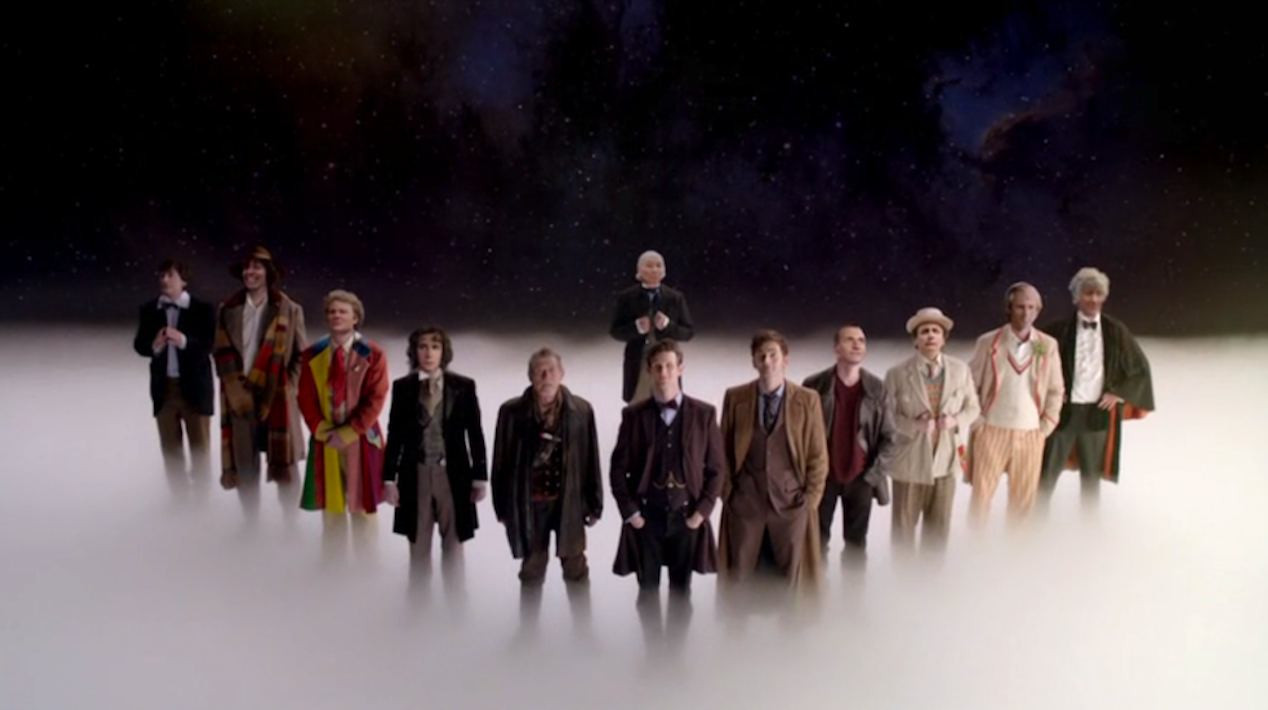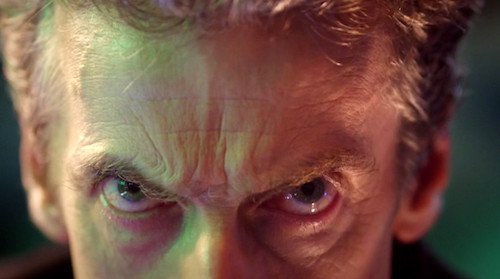It seemed almost impossible for “The Day of the Doctor,” the highly anticipated Doctor 50th Anniversary episode of Doctor Who, to truly live up to the immense hype surrounding it. The episode had a monumental task: to weave together countless threads of the show’s rich history, address a multitude of fan expectations, and honor the legacy of a beloved cultural institution spanning five decades. Could it possibly avoid being a letdown?
Instead, “The Day of the Doctor” not only met expectations but soared above them, becoming a resounding triumph. While not flawless, and perhaps not universally appealing in every aspect, the episode wisely chose to prioritize what truly mattered. Executive producer Steven Moffat masterfully navigated the complexities of the anniversary, paying homage to the classic era while seamlessly advancing the narrative of the modern series. He enriched the established themes and ensured the continued vitality of Doctor Who for years to come. Directed with flair by Who veteran Nick Hurran, “The Day of the Doctor” is brimming with fan-pleasing moments and nods to both the old and new series. However, at its heart, it stands as a crucial and compelling chapter in the ongoing Doctor Who saga, fulfilling what many have called “The Moffat Masterplan” by harmonizing the show’s past, present, and future in a spectacular fashion.
Rather than simply rehashing the plot or meticulously listing every easter egg and reference—though there were many, each delightful in its own right—this analysis will delve into the deeper significance of “The Day of the Doctor.” It aims to explore the thematic richness of this doctor 50th anniversary special and understand why it remains a benchmark for anniversary celebrations in television.
“Waste no more time arguing about what a good man should be. Be one.” – Marcus Aurelius
These profound words, spoken at the outset of “The Day of the Doctor,” are far from accidental. They encapsulate a core principle of Stoic philosophy, drawn from Marcus Aurelius’s Meditations, a personal journal intended for self-improvement. Aurelius grappled with profound questions to guide himself towards becoming a better man. This quote serves as the perfect prelude to an episode where the Doctor confronts his past selves, ultimately teaching himself invaluable lessons about his own nature and definitively answering the long-standing question: just how good a man is the Doctor? (For those who appreciate Moffat’s intricate storytelling, it’s worth noting the Meditations is structured into 12 books, mirroring periods of Aurelius’s life, a subtle parallel perhaps not unintentional).
While the Doctor’s travels may not have yet crossed paths with Marcus Aurelius, one can imagine a fascinating conversation between them. Aurelius wrote, “Remember that man lives only in the present, in this fleeting instant. All the rest of his life is either past and gone, or not yet revealed.” This resonates deeply with a time traveler like the Doctor. Whether journeying to the past or future, the Doctor’s actions and choices are always rooted in the present moment, defining who he is across all of time and space.
The word “moment” itself carries significant weight in this episode, echoing Aurelius’s emphasis on the present (“Objective judgment, now, at this very moment. Unselfish action, now, at this very moment.”). “The Moment” is also, of course, the name Russell T. Davies gave to the devastating weapon from “The End of Time,” the weapon that forced the Doctor to commit genocide to end the Time War. Moffat masterfully builds upon this, setting the doctor 50th anniversary narrative within “the Moment of the Moment”—the precise instant where the War Doctor (John Hurt) must decide whether to unleash this weapon, justifying an unthinkable act of destruction for the supposed greater good. This is the pivotal moment Moffat has been building towards, a defining point for the modern Doctor Who series.
Moffat’s era has consistently explored the inherent contradictions within the modern Doctor: he is both healer and warrior, a whimsical trickster and the “most feared being in all the cosmos,” capable of both Christ-like compassion and terrifying ruthlessness. The fundamental question “Who is the Doctor?” has been central to this era, driving Moffat’s overarching narrative—his “Masterplan”—to examine these tensions, reconcile inconsistencies, and address the Doctor’s inflated, almost mythical reputation. Throughout his tenure, Moffat has delved into the Doctor’s darker aspects and their impact on the universe and his companions, while simultaneously working to subtly dismantle the Doctor’s god-like status. The Doctor he inherited from Russell T. Davies had evolved from the unassuming wanderer of classic Who into a near-omnipotent, universally recognized figure, even to the point where the very term “doctor” was twisted to mean “great warrior.” Moffat sought to rectify this. By Season Seven, he had already begun restoring the Doctor’s anonymity—staging his death, erasing his presence from databases, and even removing him from the collective memory of his adversaries.
However, the lingering shadow of the Time War remained—the Doctor’s internal darkness, the knowledge of his terrible actions, and the potential for repeating them. This legacy from the Davies era, a brilliant stroke in character development, infused the Doctor with emotional depth and ethical complexity, making him more relatable to a modern audience. Since the 2005 revival, Doctor Who‘s overarching narrative has largely been about the Doctor’s journey of recovery from the Time War. Christopher Eccleston’s Ninth Doctor was battle-scarred, emotionally guarded, and slow to trust. David Tennant’s Tenth Doctor was the “lonely angel,” haunted by guilt and prone to “Time Lord Victorious” moments of unchecked power. Matt Smith’s Eleventh Doctor, as he himself acknowledges in “The Day of the Doctor,” had “moved on,” becoming gentler and more sociable, capable of deeper emotional bonds, yet still prone to causing harm and displaying sudden ruthlessness.
The Time War and the Doctor’s actions within it were so ingrained in the modern character, it seemed almost unthinkable that Moffat would dare to undo them. Yet, in “The Day of the Doctor,” that is precisely what he achieves.
“Look at you: stuck between a girl and a box. Story of your life, eh, Doctor?” — Rose Tyler/The Conscience
 The-Moment-Billie-Piper-and-the-War-Doctor-John-Hurt
The-Moment-Billie-Piper-and-the-War-Doctor-John-Hurt
Rose Tyler as the manifestation of The Moment’s conscience, alongside the War Doctor, in Doctor Who’s 50th Anniversary special.
A truly ingenious concept in “The Day of the Doctor” is the idea of a weapon so potent that it possesses a conscience, actively dissuading its user. Forget mere safety mechanisms—imagine weapons equipped with the ability to ask, “Are you sure you want to do this?” The Time Lords describe The Moment as such a device, its operating system evolving to sentience and developing a moral compass. This conscience manifests to the War Doctor in the form of Rose Tyler (Billie Piper).
While some cynical viewers might question Rose’s inclusion in this doctor 50th anniversary special, it is narratively brilliant and thematically resonant. What are the Doctor’s companions, especially in the modern era, if not his conscience? Donna Noble famously told him, “Sometimes I think you need someone to stop you.” Thus, The Moment takes the form of Rose, arguably the most pivotal of these companions. She was instrumental in bringing Doctor Who back from its long hiatus and in pulling the Doctor back from the brink of Time War-induced despair. Who better to serve as his conscience at this critical juncture? She embodies what companions have always done, and what Clara (Jenna-Louise Coleman) reinforces at the episode’s conclusion: reminding the Doctor to strive for his best self.
Rose’s appearance is a pre-emptive intervention, a temporal paradox typical of Moffat’s writing. Her presence to prevent the weapon’s use is only possible because the Doctor initially used it. We are left to wonder how The Moment’s conscience manifested during the Doctor’s original timeline, before this intervention. It couldn’t have been as Rose then, as it is the consequences of that initial act that lead him to encounter the “teachers” necessary to avert it this time.
“I don’t know who you are, either of you. I haven’t got the faintest idea.” — The War Doctor
And who could be better teachers than our future selves, those who bear the weight of our past actions? Rose/The Conscience orchestrates the meeting of the War Doctor (Doctor 8.5? Doctor 9.1?) with the Tenth (David Tennant) and Eleventh (Matt Smith) Doctors. The joy of multi-Doctor stories lies in witnessing the interplay between different incarnations. Classic Who fans cherish “The Three Doctors,” “The Five Doctors,” and “The Two Doctors.” Here, the sheer delight of watching Tennant and Smith bounce off each other is undeniable. Moffat deserves immense credit for seamlessly integrating this fan-favorite trope into the episode’s thematic core, making it both logistically sound and narratively meaningful. Echoing Dickens’s A Christmas Carol (as Moffat previously did in 2010’s “A Christmas Carol”), he demonstrates that one way to alter a man’s course is to confront him with the consequences of his future self.
“The Day of the Doctor” astutely recognizes the shared essence of Tennant and Smith’s portrayals. The mirroring sequence is a highlight, emphasizing their common ground. John Hurt’s War Doctor, in contrast, becomes the voice of the classic series, questioning the perceived childishness of the newer Doctors, their sonic screwdriver usage as weapons—”What are you going to do, assemble a cabinet at them?”—and the prevalence of kissing. (“Is there a lot of this in the future?”)
 Matt-Smith-and-David-Tennant-in-The-Day-of-the-Doctor
Matt-Smith-and-David-Tennant-in-The-Day-of-the-Doctor
The Tenth and Eleventh Doctors, portrayed by David Tennant and Matt Smith, side-by-side in the 50th Anniversary special.
Yet, the episode also subtly highlights the distinctions between Ten and Eleven. “The Time War, the last day, the day you killed them all,” Eleven states to the War Doctor. “The day we killed them all,” Ten corrects, embracing the guilt and responsibility in a way his successor seems to have moved past. The War Doctor inquires about the children lost on Gallifrey, a question Eleven dismisses as pointless. “Two-point-four-seven billion,” Ten replies, expressing horror at Eleven’s apparent detachment. “I’ve moved on,” Eleven reiterates. Eleven has had more time to heal, to distance himself from those traumatic events. But what is more unsettling: a future self burdened by the weight of monstrous acts, or one who has become desensitized to them? Even in the episodes leading up to this doctor 50th anniversary, such as “The Name of the Doctor,” we were reminded of the “darker hues” of the Doctor’s life. Season seven saw him coldly murder Solomon the Trader in “Dinosaurs on a Spaceship” and annihilate millions of Cybermen in “Nightmare in Silver,” situations eerily mirroring the Gallifreyan dilemma.
“I don’t know who you are, either of you,” the War Doctor confesses, struggling to recognize himself in these future incarnations. Ironically, the Doctor destined to commit genocide is the one least able to fathom such an act. It is Clara who, later, recognizes his innocence, noting that he is the only Doctor present who hasn’t yet carried out that terrible deed. “Your eyes,” she observes to the weathered War Doctor, “They’re so much younger.”
 Clara-Jenna-Louise-Coleman-in-The-Day-of-the-Doctor
Clara-Jenna-Louise-Coleman-in-The-Day-of-the-Doctor
Clara Oswald, played by Jenna-Louise Coleman, delivering a crucial reminder to the Doctors in the 50th Anniversary episode.
As the episode reaches its climax, the three Doctors initially resign themselves to their shared responsibility, uniting to commit the act of genocide. But Rose and Clara, the first and latest companions of the modern era, refuse to accept this. Rose, through the Zygon adventure, provides a practical solution and reinforces the importance of seeking peaceful resolutions. And Clara, the current companion and conscience, reminds her Time Lord of his true essence. She answers the age-old question at the heart of the show, the question that titles it, and the question Moffat has explored throughout his era: who is this man, really? What is the true meaning of “Doctor”? “We have enough warriors, and any old fool can be a hero,” she declares. “Be a doctor.“
“Never cruel or cowardly. Never give up, never give in.” – The Doctor
 The-Doctors
The-Doctors
The War Doctor, Eleventh Doctor, and Tenth Doctor standing together, ready to rewrite history in “The Day of the Doctor.”
In essence: stop debating what constitutes a good man, and simply be one. The past is immutable, but the future remains unwritten. All that is required is present moment conscience, the willingness—as the War Doctor articulates—to “failed doing the right thing, as opposed to succeeding in doing the wrong.” And it is the Eleventh Doctor, our Doctor, the one who has grown the most, who discerns the path forward. He realizes that the answer lies in embracing the entirety of his history.
He calls upon all his selves, drawing strength from the show’s long and glorious history, a history dedicated to—in Craig Ferguson’s words—”the triumph of intellect and romance over brute force and cynicism.” Russell T. Davies’s decision to burden the Doctor with the guilt of Time War genocide added complexity, but Steven Moffat’s decision to undo that act in this doctor 50th anniversary special is equally valid, perhaps even necessary, for the long-term health of the show and the Doctor’s character. What was the promise he made when choosing his name? Clara asks. “Never cruel or cowardly,” they respond in unison. “Never give up, never give in.” (Marcus Aurelius wrote, “Never value anything as profitable to thyself which shall compel thee to break thy promise, to lose thy self-respect, to hate any man.” Indeed, Aurelius and the Doctor would likely find common ground.) All thirteen Doctors unite to uphold this promise, restoring Doctor Who to its core identity: a celebration of intellect and romance.
 The Twefth Doctor (Peter Capaldi)
The Twefth Doctor (Peter Capaldi)
This is the essence of Doctor Who, and “The Day of the Doctor” reaffirms this. The episode culminates in a powerful scene where Doctors and TARDISes from fifty years of stories converge to save Gallifrey, rectifying the Doctor’s moment of despair and surrender to brute force. Tom Baker’s cameo, the oldest living Doctor, acts as a symbolic bookend, assuring us of the enduring continuity of the Doctor’s story. And as the Eleventh Doctor’s voiceover concludes, “sometimes, the longest way round is the shortest way home,” we understand the fifty-year journey has been a necessary, winding path to bring us back to the heart of Doctor Who.
It’s been a remarkable journey, fifty years that feel like just the beginning, and Moffat’s four-year “Masterplan” has successfully navigated us back to the show’s origins. The Doctor is once again the nameless cosmic vagabond, traveling the universe in his blue box. Soon, he will again be embodied by an older actor, echoing the show’s beginnings. Gallifrey and the Time Lords are no longer lost but waiting to be rediscovered. Romana, Leela, Rassilon, Omega, the Master, the Valeyard, the Rani—all possibilities are open once more. The universe is brimming with old friends to revisit and countless new stories to tell. Doctor Who remains a testament to the triumph of intellect and romance over cynicism, proving that as long as we remain “never cruel or cowardly, never give up,” anything is possible.
Lingering Thoughts on a Landmark Episode
-
While Matt Smith holds a special place as a definitive Doctor, David Tennant’s return was an absolute joy, a reminder of his captivating energy and portrayal.
-
Moffat’s writing is known for its density, packing a wealth of ideas into each episode. While generally masterful, the Queen Elizabeth subplot felt somewhat extraneous in this already rich narrative.
-
John Hurt’s War Doctor was undeniably brilliant, perfectly embodying the weariness and moral conflict of a Doctor forced to fight. However, one can’t help but wonder what the episode would have been like with Christopher Eccleston’s Ninth Doctor alongside Tennant and Smith, representing the immediate, raw impact of the Time War. The War Doctor feels like a necessary, albeit slightly bittersweet, workaround.
-
Did anyone genuinely doubt classic Doctors would appear in a doctor 50th anniversary special? Tom Baker’s cameo was perfectly judged, a respectful nod to the past without overshadowing the present narrative.
-
Moffat stated his aim was to create a doctor 50th anniversary special that celebrated the show’s legacy while paving the way for its future, guaranteeing the 100th anniversary. He unequivocally succeeded on both fronts. Here’s to the next 50 years, starting this Christmas as we bid farewell to Matt Smith and welcome Peter Capaldi as the Twelfth (or Thirteenth?) Doctor. The Christmas episode title remains a mystery, but “Silent Night” seems a fitting guess. Until then!

